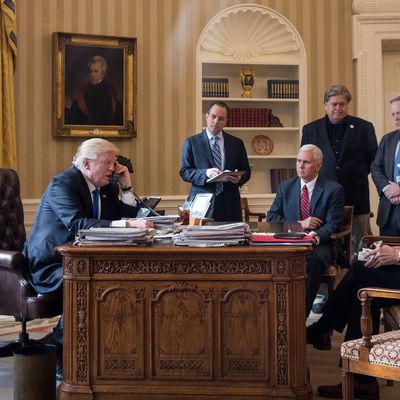
Donald Trump is already publicly floating the first of what will probably be several waves of firings of his top staff, while the news is a daily procession of astonishing revelations that paint the president of the United States as a lazy, ignorant, temperamental man-child who flouts basic security requirements and signs major orders he has not bothered to read. Or so it might appear to the outside world. Christopher DeMuth, a “distinguished fellow” — that is his actual job title — at the conservative Hudson Institute detects a different pattern at work. In a Wall Street Journal op-ed, the conservative scholar explains why President Trump’s seemingly chaotic managerial style actually reflects a shrewd and even brilliant grasp of his power.
“President Trump may be rediscovering a venerable method of leadership that has been forgotten in our era of ideological messaging,” argues DeMuth. “Rather than viewing disagreement as a problem,” he attracts “highly accomplished, strong-minded advisers” who engage in “vigorous debate.” So the daily stream of Trump aides anonymously blaming one another for the administration’s failures is actually, to DeMuth, evidence of the president’s sound management.
What are the specific practices that Trump has embraced to make his young presidency such a rousing success? DeMuth argues:
He forgoes ideology for simple, cross-partisan principles: America First, safety from terrorism and violent crime, better jobs and schools for the poor and working class, defiance of self-serving elites.
Apparently a lesser president would never have thought to make simple and popular promises like preventing terrorism and creating good jobs. DeMuth does not bother with the question of whether Trump has any policies to accomplish those goals — he is sufficiently impressed that Trump would think to promise them.
Trump also has the cleverness to say crazy stuff:
Most of all, President Trump is comfortable with controversy and dissent, indeed often incites them to advantage. His tweets and pronouncements can be outrageous and overstated—Up to a point, Lord Copper!—but they demonstrate a healthy skepticism toward ossified orthodoxy and, critically, are designed to stimulate debate rather than close it down.
Orthodox opinion believes that higher concentration of greenhouse gasses causes higher long-run temperatures, very few ineligible voters participate in presidential elections, and Trump’s inaugural crowd had many fewer attendees than Barack Obama’s first inaugural crowd. DeMuth does not quite endorse all of Trump’s claims to the contrary, but sees his decision to provoke debates on such subjects as shrewd.
Trump has found the very best officials for his administration:
He has filled his cabinet with people of proven talent, including erstwhile opponents Ben Carson and Rick Perry, and named a diversified team of White House advisers.
Carson and Perry are odd choices to support the claim that Trump has attracted elite talent. According to Trump himself, Carson is “pathological” and Perry is a moron. (“He put on glasses so people think he’s smart. People can see through the glasses.”) To be sure, one might dismiss these insults on the grounds that Trump is a flamboyant liar who reflexively smears any critic who stands in his path, but aknowledging this would obviously complicate DeMuth’s argument, so he simply pretends that everybody recognizes that Carson and Perry (neither of whom had any experience in their new fields) are A-list cabinet picks.
The president has a wide-ranging thirst for knowledge:
Mr. Trump cultivates independent sources of information and is unlikely ever to become captive to his staff.
Put differently, Trump reads no books, cannot digest any summary more than a single page, and instead watches endless television, and repeats wild, false viral rumors from fake internet sites.
DeMuth finds more good news:
He is unpredictable and uses his talent for drama to keep allies focused and opponents distracted.
It is perhaps true that, in the course of alarming close American allies like Germany, France, and even Australia, Trump has caused those countries to become more “focused.” DeMuth does not explain why this is beneficial. Trump has “distracted” his domestic opponents by embroiling himself constant and numerous scandals and repeating endless falsehoods. Here, again, DeMuth does not elaborate on why this is helpful.
Having praised Trump’s frequent, unpredictable and wide-ranging tweets, DeMuth praises him for his taciturn qualities:
So far, he has been adept at indicating when the time for talk is over, as when he shut down the Republican debates over ObamaCare “repeal and delay” and the House’s overhaul of its ethics office. That suggests he will be decisive in informing subordinates when the moment has arrived to stand together.
Trump did state that he had virtually finished a plan to repeal Obamacare, indicating the debate was over. But this comment reportedly confused his allies, who quickly discovered the plan Trump described was in fact “entirely a figment of Trump’s imagination.” The debate has not even come close to ending.
Trump, argues DeMuth positively but vaguely, is doing good things in the intelligence field:
“his intelligence reforms are off to a good start but will encounter fierce bureaucratic resistance.”
Trump attacked the Central Intelligence Agency, later visited the agency to deliver a rambling, self-aggrandizing speech about himself, appointed as director of National Intelligence Michael Flynn, a conspiracy theorist who pointedly rejects any data that fails to confirm his assumptions, and who Trump may well fire within his first month on the job. A good start! DeMuth does not explain what a “bad start” would look like.






























